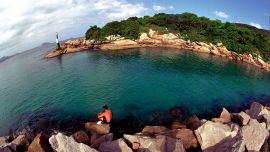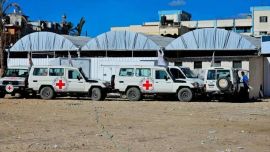The images of dead civilians in the streets, mass graves and bombed-out buildings emerging after Russian troops departed areas near Kyiv have prompted Western allies to dispatch investigators to collect and analyze evidence for possible war crimes trials.
But don’t expect swift justice.
Even as the world expresses outrage over graphic images of carnage in towns like Bucha and Ukraine’s President Volodymyr Zelenskiy calls for a Nuremberg-like trial for those responsible, United Nations and Western officials acknowledge that any international effort to pursue war-crime charges may take years.
“When you have a mass grave, each body has its story and you have to investigate each and every one of those stories,” said Louis Charbonneau, United Nations director at Human Rights Watch. “So you need forensics experts and all kinds of people with training and knowledge. If you start digging without the proper expertise, you can destroy evidence.”
Russian officials deny their forces committed any atrocities. They say the scenes emerging from areas Russia had controlled are Ukrainian fabrications or were perpetrated by Ukrainian forces, but they have provided no evidence for those claims.
Western nations are rushing to ensure that the right expertise is available to help Ukrainian investigators and prosecutors document crimes and responsibility for them.
London police dispatched their “war crimes team” to assist a probe by the International Criminal Court, while Germany’s Foreign Intelligence Service, BND, has presented recordings of Ukrainian survivors of alleged war crimes to a parliamentary committee in Berlin.
In addition, the United Kingdom appointed an independent adviser to assist Iryna Venediktova, Ukraine’s prosecutor-general. US prosecutors met this week with European counterparts in Paris as they work out a plan to gather evidence, Attorney General Merrick Garland said Wednesday.
Gathering evidence
UN officials and staff from the ICC are also gathering evidence that can be used in a future case. Ukraine Interior Minister Denys Monastyrskiy called it a “large-scale, unprecedented” effort to record “massive war crimes, crimes against humanity, which were committed by Russian troops that were on Ukrainian territory.”
With investigators rushing to document the situation on the ground as Russian forces pull back, their work remains dangerous and is often suspended on little notice, according to a UN diplomat who asked not to be identified discussing sensitive issues.
Investigators in Ukraine have had to relocate repeatedly due to Russian bombing, the person said. Members of the fact-finding group, known as the Human Rights Monitoring Mission in Ukraine, have been unable to visit the locations of incidents, relying on trusted contacts and satellite imagery to document civilian casualties, the person said.
Yet the biggest delays may ultimately be bureaucratic. It took more than a decade, for instance, to put former Yugoslav leader Slobodan Milosevic on trial for his role in perpetrating atrocities against Bosnian Muslims. Milosevic died while in custody, before a verdict. ICC charges of crimes against humanity against the late Sudanese President Omar Al Bashir never managed to even secure his arrest.
This time will be different, officials insist.
“The wheels of accountability can move slowly, but they move, and someday, some way, somewhere, those who committed these crimes and those who ordered the crimes will be held accountable,” US Secretary of State Antony Blinken said in an interview with NBC News.
Yet there are few expectations that Russian President Vladimir Putin will face Milosevic’s fate, ending his days in a prison cell near The Hague, where the ICC is based.
A more immediate challenge for Western allies is how to coordinate the vast resources being offered to Ukraine. French Minister of Justice Eric Dupond-Moretti told Le Monde that Ukraine appealed to Eurojust, the European Union’s agency for judicial cooperation in criminal matters, to centralise the work of investigators and the collection of evidence.
Eurojust said it backs a joint investigation team initially formed by Lithuania, Poland and Ukraine to probe war crimes, crimes against humanity and other “core crimes,” adding that additional nations may join the team. Polish prosecutors say they have collected about 1,000 pieces of witness testimony describing instances of alleged war crimes as well as other evidence.
'Options and mechanisms'
Evidence gathered by a variety of entities will be cross-checked among allies, experts say. One question for now is who would prosecute the case. UN Secretary-General António Guterres has called for an independent probe, and 41 nations have asked the ICC to investigate allegations of mass atrocities.
And although the United States is cooperating with the ICC, it isn’t a member state and has clashed with the organisation over its investigations into Israeli actions in Palestinian territories as well as efforts to look into American military operations in Afghanistan. US officials have declined so far to say whether the ICC would be the right court to pursue a case against Russia, which also isn’t a member of the ICC.
There are “different options and different mechanisms we’re working through now,” White House Press Secretary Jen Psaki said. “But it has not yet been determined what the international mechanism is.”
Other options would be for Washington and allies such as Germany and France to create an ad hoc international tribunal outside of the UN or for a country’s domestic court system to take up the case under “universal jurisdiction.”
The concept of universal jurisdiction enabled Israel to prosecute a senior Nazi official, Adolf Eichmann, for his role in the Holocaust. More recently, a German court sentenced a Syrian leader for his role in torturing thousands of people as head of interrogation in a prison in Damascus.
But any such efforts would undermine the legitimacy of the process, Human Right Watch’s Charbonneau said.
“It’s very important these investigations be seen as independent and credible for everyone,” Charbonneau said. “You want to make it impossible for Russia to come up with conspiracy theories.”


























Comments